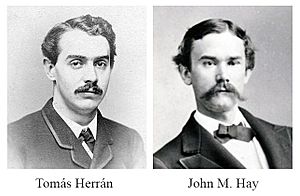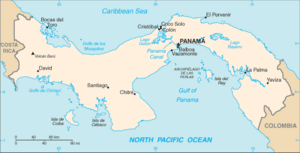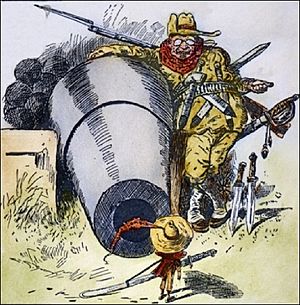Hay–Herrán Treaty facts for kids
The Hay–Herrán Treaty was an agreement signed on January 22, 1903. It was made between the United States and Colombia. The main idea was to let the United States lease a piece of land in Panama to build a canal. At that time, Panama was part of Colombia.
Contents
What Was the Hay–Herrán Treaty?
This treaty was a big plan for the United States. It wanted to build a canal across the isthmus of Panama. This canal would connect the Atlantic Ocean and the Pacific Ocean. It would make shipping much faster and easier.
The treaty was signed by John M. Hay, who was the United States Secretary of State. He signed for the United States. Tomás Herrán signed for Colombia.
What the Treaty Proposed
The agreement suggested that the United States could lease a strip of land. This land would be six miles wide. The lease would last for 100 years and could be renewed.
For this lease, the United States offered to pay Colombia $10 million. They also offered an annual payment of $250,000. Both payments were to be made in gold coin.
Why the Treaty Was Important
The United States wanted to build the Panama Canal. This canal was a huge project. It would change global trade and travel. The treaty was meant to give the U.S. the right to start this massive construction.
Why the Treaty Failed
The Hay–Herrán Treaty needed to be approved by both countries. The United States Senate approved it on March 14, 1903. But the Senate of Colombia did not approve it. So, the treaty never became law.
Reasons for Colombia's Decision
Many people believe there were two main reasons why Colombia did not approve the treaty. First, Tomás Herrán had negotiated the treaty mostly by himself. He did not have much input from his government or other lawmakers.
Second, many Colombian politicians felt the money offered was not enough. The United States was willing to pay another company $40 million for its old equipment and digging work. This made the $10 million offered to Colombia seem too small.
What Happened Next
The United States government did not want to change the treaty. They also did not want to offer more money to Colombia. Instead, they decided to support a different plan.
Panama's Independence
The United States soon gave its support to a planned uprising in Panama. This support included both political and military help. This uprising led to Panama becoming an independent country.
After Panama gained its independence, the United States was able to make a new agreement directly with Panama. This new agreement allowed the United States to build the Panama Canal.
See also
 In Spanish: Tratado Herrán-Hay para niños
In Spanish: Tratado Herrán-Hay para niños
 | Selma Burke |
 | Pauline Powell Burns |
 | Frederick J. Brown |
 | Robert Blackburn |




